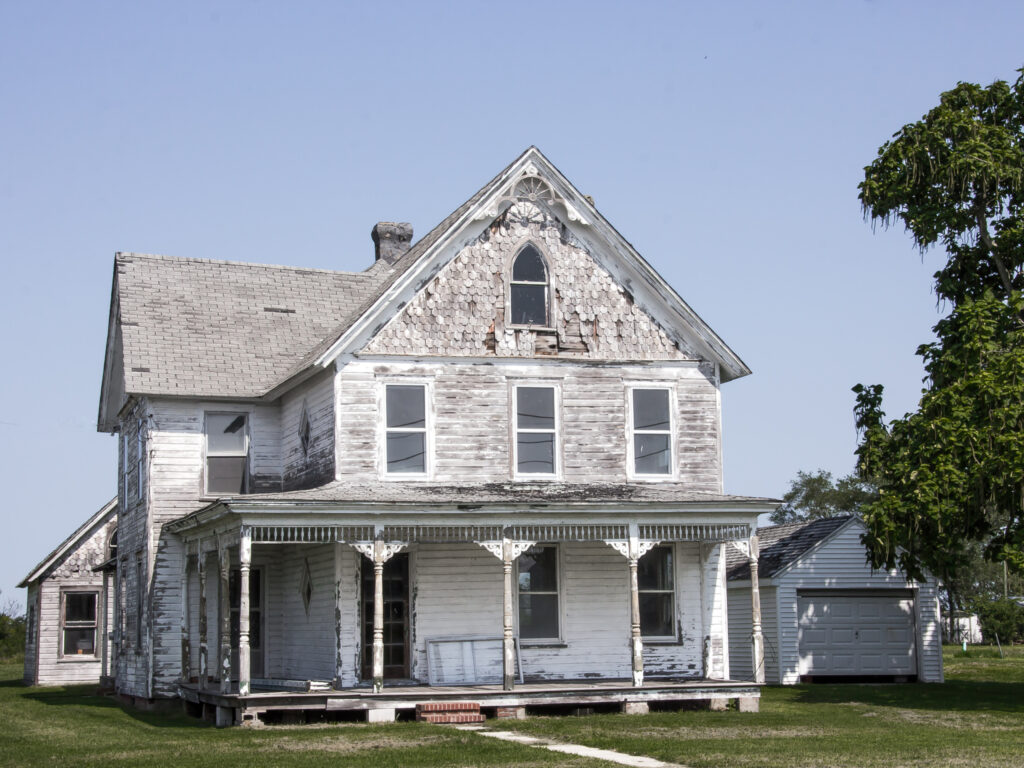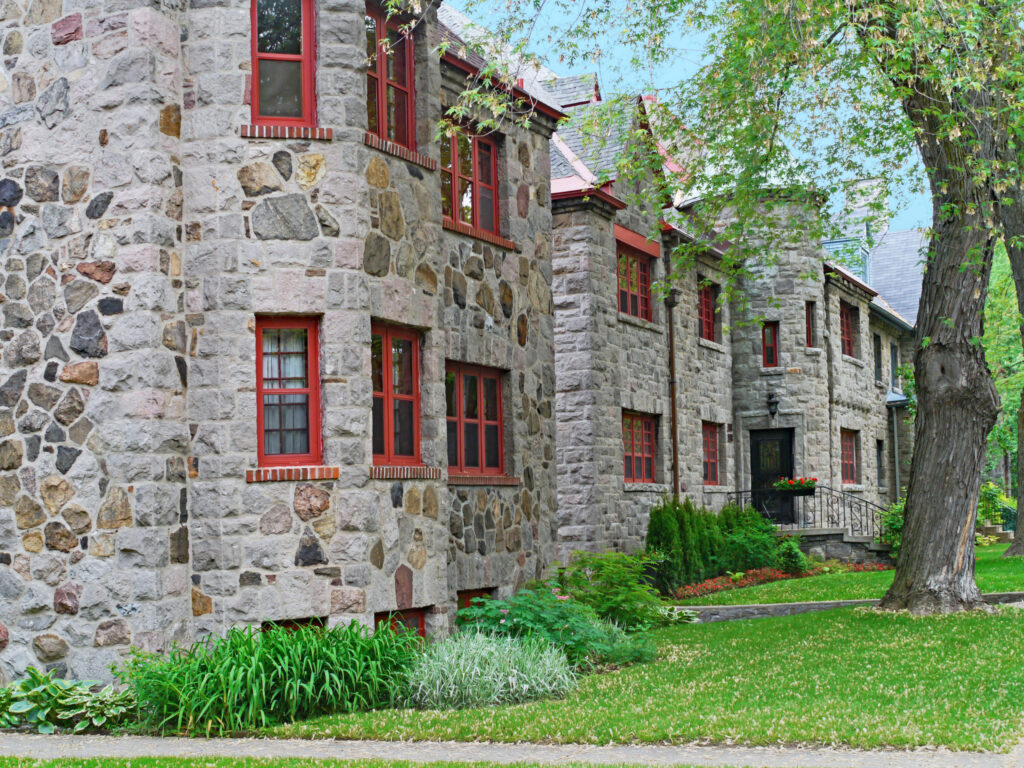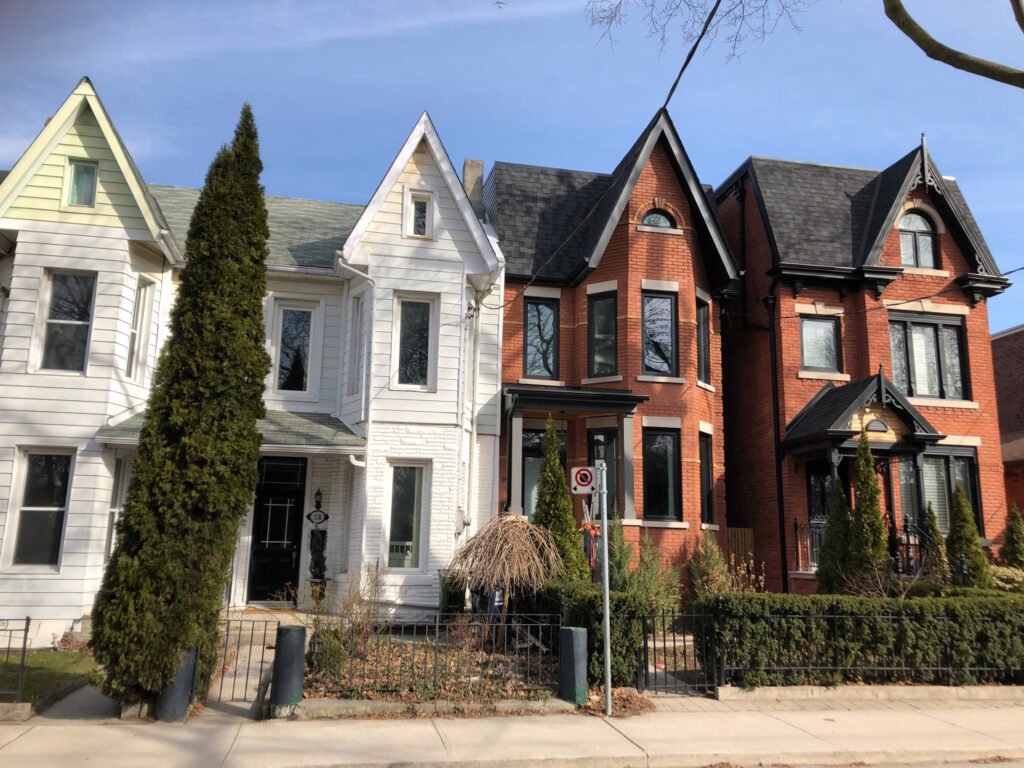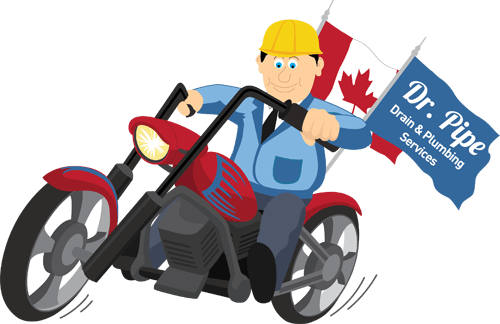Give us a call today: 416 663 4777 for a free upfront estimate!

Water: The Most Common Problem in Old Houses
One of the most frequently asked questions of our clients is: “What is the worst danger when purchasing an old house?” The answer is simple: “Water”.
Let’s start from the beginning. What is an old house? Let’s walk around the areas of our city – Toronto: Down Town Area – 110-80 years old, St. Clair up to Lawrence – 80-50 years old, from Eglinton up to Steeles – 50-30 years old.
One of the most widespread problems is basements flooded with sewer water or mix of storm and sewer waters. Many of us remember the damage caused by the storm on August, 19th, 2005 in North York. Why do floods like that occur, and more importantly, who is going to pay for it?
Basement Flooding: Causes and Costs
Three Principal Causes of Basement Flooding
There are three main reasons why basement flood occurs:
- Tree roots in sewer pipes under the ground.
- Clogged running trap (the central gangway) on a sewer pipe in the house or, worse than that, in the street under the ground.
- Broken sewer pipes under the ground.
Why Inspection is Important
As a rule, when purchasing an old house, the seller will show you a certificate stating that the house has passed the overall inspection. Most of the time, it is the truth. You, being a more suspicious person, can call your inspector, who will provide you with the same information.
So where is the problem? Inspectors tend to draw their conclusions only about visible parts of the house, systems, and equipment. That doesn’t tell the whole picture. Many important parts of a home are hidden under plaster partitions, inside the walls, or under the ground, which the inspector could not possibly see and therefore log.
The person who sold, having lived in the house for 2-3 years for certain knew about all the home’s problems. He probably knew about the backed-up sewer and the flooded basement. He bought the house to resell it after easy repair, and you have bought it to live and prosper in.
The Nightmare Scenario: Basement Flooding After Purchase
Let’s imagine what might happen. After purchase the repairs are over and you plan to rent out the basement, or just make your childhood dreams come true – get yourself a pool table for the basement. House warming, visitors, good mood – everything is fine, until a week later when it rains.
You come home to your lovely, new house, you swim in, and discover a sewer water pool with your favorite pool table in the middle of your basement. And the “pool” word game really does not amuse you. Your nightmare has begun – frustration, yelling at the inspector, at City, the insurance company and the moon do not deliver much relief. As mentioned earlier, in Canada in the end the responsibility lies on your shoulders.
Emergency services from the city must be fully convinced, that the problem is on their property in order to start the repairs – and that takes time. Much longer than you would have expected. Sometimes even days. Meanwhile, the stinkhole your house has turned into is smelling and looking worse. In addition, your tenant’s lawyer is threatening you to pay for their now drowned forever computers and other appliances.
Something needs to be done immediately. The City technician tells you something about “clean-outs” which are supposed to be installed and not there to clean the water drain and he will return to investigate only after you install them. Time goes on – the stench is now unbearable.
Dealing with Emergency Situations and City Technicians
Subsequently, you decide to take matters into your own hands. And here arrive the protagonists of our opus: sanitary technicians, in clean white vans with top-notch equipment and the desire to help – for a “modest” pay of course.
The Costly Reality: Dealing with Basement Flooding
Cost Breakdown: Repairs and Replacements
So what are the costs?
- Inspection
Snaking and inspection with a video camera will cost from $200 to $500. Usually, you are in shock from the last call from your tenant’s lawyer combined with the fumes, so you don’t really care.
- Repair
Let’s take a look at two possible reasons of the problem: clogged or broken building traps or damaged sewer pipes (whether broken or damaged with tree roots):
Building trap inside the house under a concrete floor replacement and additional clean-out for snaking & inspection will cost from $1000 to $1500 – well, at least now you don’t need a belt for wearing your pants with a wallet in the pocket. Sometimes the Building Trap is installed in the street under the ground – as in Down Town up to Laurence. Then the technicians take larger bites: $1500 to $2500 depending on the area and depth. Feeling extremely light today, eh?
Damaged pipes with tree roots inside can lead to partial or full replacement of sewer pipes, which of course are under a concrete floor inside the house and outside under the ground up to the borders of the City Property. Now the price hangs somewhere between $1500 and $12,000. The price could be even more, depending on the size of your house and property.

Post-Purchase Repairs and After-Flood Costs
As for after purchase repairs and after-flood damage repairs? Let’s see…$30 per sq. feet repairs multiplied by 2 and by an average basement size of 800 sq/feet. We add sanitary works $12000 (worst scenario of course – after all, the worst thing always happen) and by pressing the “=” button we glaze on $60,000 taking most of the screen and not taking any place in our bank account.
That is, of course, not including the pool table or the rent money you didn’t get, guitar string, nerves and a basin of wasted time.
Yeah, yeah, yeah…and what about the insurance you ask? And, well, you’re right. But! (Yes there are always those nasty words written in very small letters that you just didn’t happen to notice while signing the contract). Insurance companies, some of the time and, I emphasize, only some of the time, partially cover damages.
But hey!?, What’s that? The flood was caused by broken pipes that were already broken when you bought the house? “Excuse us”, the insurance inspector tells you while getting a portable microscope out of his briefcase, but didn’t you see those words down on the last page that say “No insurance on already broken pipes?” Waiting for help from insurance companies is very problematic. If there is any coverage, there is always the bureaucracy to spoil your instant money. And repair needs to be paid today.
We know that insurance companies, as well as banks, tend to distribute umbrellas in sunny weather that melt when naked to water. So salvation lies within yourself. My advice to you: bring a reading lens and read what exactly you are paying for before signing anything.
What to Do When Facing Basement Flooding
So what should you do? First off, calm down. Don’t hurry and sign the contract for emergency services for more than $300 right away.
Secondly, your house is already flooded and the damages will hardly get worse. Ask the lawyer to have a cup of coffee with you and wait until you get things straight.
Calmly estimate the situation. Make a market survey – call our company and make sure you are not paying for the plumber’s new Lamborghini. Make sure you pay what the damn thing’s really worth. Sign the contract (with a reading lens as always) within reasonable boundaries.
Always keep in mind that cheap does not always mean same quality and page-wide yellow pages ads have to be paid for – out of your pocket of course. Choose reasonable, average prices. An expert licensed plumber from our company can advise you of the right professional in your particular case.
Your neighbor Jack the contractor can hardly help you even if he wants to. Most of the time he simply lacks the equipment required.
The Importance of Proper Equipment and Licensing
And one last thing – try to get some feedback about a company. Not everyone is trustworthy.
And let’s focus on that last thing. As I already mentioned, the absence of necessary, and at times very expensive, equipment. Always remember that avaricious pays twice. Jack can hammer away the clogging in the pipe, not having checked with a special video camera the sewer pipes, he cannot see the core of the problem and it may come again with a larger extent.
And of course let’s not forget that Jack is not a licensed sanitary technician or even worse – has no Business Plumbing or Metro Plumbing License.
Whenever you apply for the refund from City of Toronto (Roots rebate), which can get up to $2000, or even $3200 in cases with back water valves on sewer and storm pipes on your property, you will discover Jack cannot be paid from the city’s treasury as an original receipt on payment from a legal, Metro Plumbing License technician is required, in addition to the conclusion of a city sanitary inspector who was present during the works.
Is Buying an Old House Advisable?
So, would I advise to buy an old house? I sure do. After all, not all of us have that extra few bucks hiding under the pillow. And of course, as mentioned before, you should always know what you are paying for. A quick call to our company will deliver a plumbing service through the examination of both surface and underground sewer pipes including a video tape that you will receive as a law suit proof on the sewage condition at time of purchase.
You will also receive a wide coverage record concerning all aspects of your future home pipe systems. You will be advised on the future repairs needed, and estimate the spectrum of expenses for your trouble free future. Later on you can discuss this report with the seller and probably lower the price of your future shelter.
So, you followed my advice and bought an old house. Well, congratulations. After the last mover left your doorstep, you probably want a good refreshing shower. You open up the valve but only a whiff comes out – certainly not enough for a dreamy shower! Well don’t blame me… It’s time to discuss a water pressure.

The Cases of Bad Water Pressure
Understanding Bad Water Pressure
When it comes to our showers, why must we deal with poor water pressure? This is a question many of us have pondered. There are four main answers to this common issue, each relating to different aspects of your plumbing system. To fully understand the problem and its solutions, let’s break it down step by step.
Before delving into the details, it’s important to note that Toronto can be divided roughly into three zones based on the age of the properties: Downtown Area (80-110 years old), St. Clair to Lawrence (50-80 years old), and from Eglinton to Steeles (30-50 years old). With this in mind, let’s start troubleshooting from the far end of the problem: the central water pipe from the city’s property to yours.
What You Should Know About Central Water Pipe
This central water pipe is typically half an inch in diameter and is often made from materials like lead, copper, or galvanized steel. Over time, due to clogging processes, the internal diameter of the pipe narrows, sometimes even down to a quarter of an inch. Beyond this point, the central water pipe from the edge of your property to the central water valve in the basement poses similar issues.
Another common problem lies in the underestimated pipe diameter in the basement distribution. Lastly, the galvanized pipes running through your walls, ceilings, and other areas can contribute to low water pressure. While these issues may seem similar, each requires different expertise and solutions.
The Simplicity and Complexity of the Central Pipe
The central pipe is both the simplest and most complex aspect to address. Historically, Canadian codes allowed for half-inch pipes within the house. However, this standard is often inadequate for modern water consumption needs. A once-sufficient pipe diameter can become insufficient as homes evolve, leading to frustratingly low water pressure. To meet new standards, the entrance pipe should be a minimum of 3/4 inches. Fortunately, the City may replace these pipes free of charge up to your property line.
Why is the central pipe the most complicated fix? It’s because many people want the same free solution. The waiting list for city pipe replacement can be long, leaving you to cope with low pressure for years. Alternatively, immediate replacement is possible for a fee ranging from $2500 to $3000 within 2-3 weeks.
Addressing Property Pipe Problems
If you’ve resolved the central pipe issue but still face pressure problems, it’s time to consider changing the pipes on your property. Depending on the extent of the plumbing work required, this can cost anywhere from $1500 to $4500, depending on your property and needs.
Basement and Internal Pipe Adjustments
Suppose you’ve tackled the previous issues but still find that water pressure remains inadequate when multiple faucets are in use. In that case, upgrading the basement pipes from the water meter to the heater, as well as the pipes from the heater to the main branches, from 1/2 inch to 3/4 inch, might be necessary. These changes can cost between $1000 and $3000.
Total Costs and Considerations
Taking all these factors into account, the costs for improving your water pressure can add up. For instance:
- City’s part underground: $2500-$3000
- Your part underground: $1500-$4500
- Basement adjustments: $1000-$2000
- Piping throughout the house: $1500-$4000
In the worst case, this totals $13500, excluding your time, frustration, and potential building work. Remember that all plumbers in Canada must be licensed, holding a Business Plumbing Metro license. After completing the plumbing work, you can request a city inspector to assess the job done to avoid potential issues down the line.
Making Informed Decisions
When purchaising a house, there are a few important considerations:
- Not all of us have an extra million for a new home.
- Before purchasing a property, ensure that all pipes and sewage systems are checked. This can help negotiate a lower price or prepare for necessary repairs.
- Follow a systematic approach, changing pipes from the end to the beginning, and ensure compliance with city recommendations.
- Avoid costly renovations before inspecting the water and sewage systems to prevent redoing work.
We have the expertise, tools, and licenses to address these challenges. Contact us at Dr. Pipe to assess your piping condition and create a plan that ensures satisfactory water pressure in your home.
Experience and Expertise
Our team possesses the top-notch equipment, proper licensing, and international experience, including Canadian, Israeli, and European backgrounds. Our operators are proficient in multiple languages, including English, Hebrew, Russian, Ukrainian, and Polish. With our comprehensive approach, you can enjoy the water pressure you deserve without the frustration.
Give us a call today: 416 663 4777 for a free upfront estimate!




